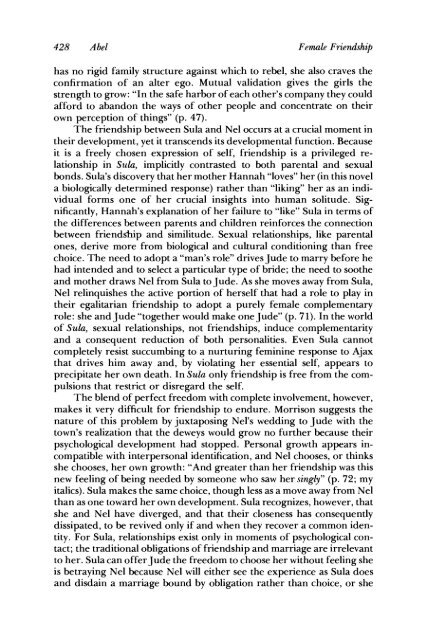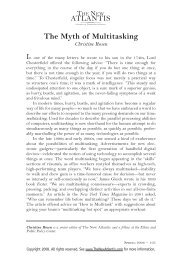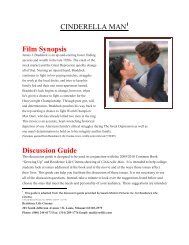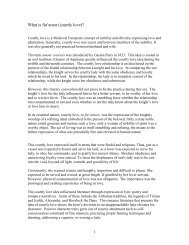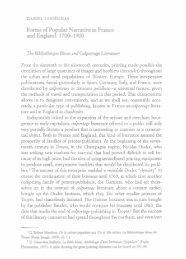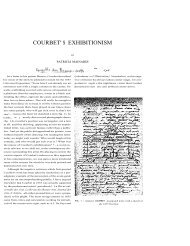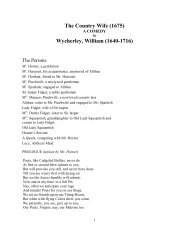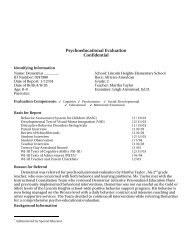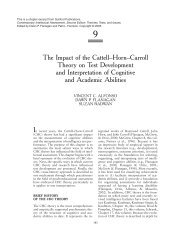(E)Merging Identities: The Dynamics of Female Friendship in ...
(E)Merging Identities: The Dynamics of Female Friendship in ...
(E)Merging Identities: The Dynamics of Female Friendship in ...
Create successful ePaper yourself
Turn your PDF publications into a flip-book with our unique Google optimized e-Paper software.
428 Abel <strong>Female</strong> <strong>Friendship</strong><br />
has no rigid family structure aga<strong>in</strong>st which to rebel, she also craves the<br />
confirmation <strong>of</strong> an alter ego. Mutual validation gives the girls the<br />
strength to grow: "In the safe harbor <strong>of</strong> each other's company they could<br />
afford to abandon the ways <strong>of</strong> other people and concentrate on their<br />
own perception <strong>of</strong> th<strong>in</strong>gs" (p. 47).<br />
<strong>The</strong> friendship between Sula and Nel occurs at a crucial moment <strong>in</strong><br />
their development, yet it transcends its developmental function. Because<br />
it is a freely chosen expression <strong>of</strong> self, friendship is a privileged relationship<br />
<strong>in</strong> Sula, implicitly contrasted to both parental and sexual<br />
bonds. Sula's discovery that her mother Hannah "loves" her (<strong>in</strong> this novel<br />
a biologically determ<strong>in</strong>ed response) rather than "lik<strong>in</strong>g" her as an <strong>in</strong>dividual<br />
forms one <strong>of</strong> her crucial <strong>in</strong>sights <strong>in</strong>to human solitude. Significantly,<br />
Hannah's explanation <strong>of</strong> her failure to "like" Sula <strong>in</strong> terms <strong>of</strong><br />
the differences between parents and children re<strong>in</strong>forces the connection<br />
between friendship and similitude. Sexual relationships, like parental<br />
ones, derive more from biologcal and cultural condition<strong>in</strong>g than free<br />
choice. <strong>The</strong> need to adopt a "man's role" drives Jude to marry before he<br />
had <strong>in</strong>tended and to select a particular type <strong>of</strong> bride; the need to soothe<br />
and mother draws Nel from Sula to Jude. As she moves away from Sula,<br />
Nel rel<strong>in</strong>quishes the active portion <strong>of</strong> herself that had a role to play <strong>in</strong><br />
their egalitarian friendship to adopt a purely female complementary<br />
role: she and Jude "together would make one Jude" (p. 7 1). In the world<br />
<strong>of</strong> Sula, sexual relationships, not friendships, <strong>in</strong>duce complementarity<br />
and a consequent reduction <strong>of</strong> both personalities. Even Sula cannot<br />
completely resist succumb<strong>in</strong>g to a nurtur<strong>in</strong>g fem<strong>in</strong><strong>in</strong>e response to Ajax<br />
that drives him away and, by violat<strong>in</strong>g her essential self, appears to<br />
precipitate her own death. In Sula only friendship is free from the compulsions<br />
that restrict or disregard the self.<br />
<strong>The</strong> blend <strong>of</strong> perfect freedom with complete <strong>in</strong>volvement, however,<br />
makes it very difficult for friendship to endure. Morrison suggests the<br />
nature <strong>of</strong> this problem by juxtapos<strong>in</strong>g Nel's wedd<strong>in</strong>g to Jude with the<br />
town's realization that the deweys would grow no further because their<br />
psychological development had stopped. Personal growth appears <strong>in</strong>compatible<br />
with <strong>in</strong>terpersonal identification, and Nel chooses, or th<strong>in</strong>ks<br />
she chooses, her own growth: "And greater than her friendship was this<br />
new feel<strong>in</strong>g <strong>of</strong> be<strong>in</strong>g needed by someone who saw her s<strong>in</strong>gly" (p. 72; my<br />
italics). Sula makes the same choice, though less as a move away from Nel<br />
than as one toward her own development. Sula recognizes, however, that<br />
she and Nel have diverged, and that their closeness has consequently<br />
dissipated, to be revived only if and when they recover a common identity.<br />
For Sula, relationships exist only <strong>in</strong> moments <strong>of</strong> psychological contact;<br />
the traditional obligations <strong>of</strong> friendship and marriage are irrelevant<br />
to her. Sula can <strong>of</strong>fer Jude the freedom to choose her without feel<strong>in</strong>g she<br />
is betray<strong>in</strong>g Nel because Nel will either see the experience as Sula does<br />
and disda<strong>in</strong> a marriage bound by obligation rather than choice, or she


